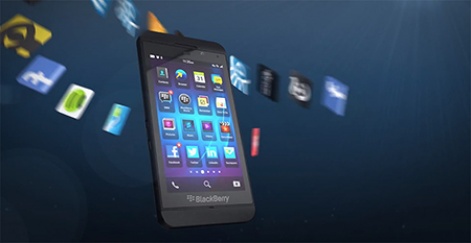You can pretty much track my time at PocketGamer.biz by dipping into articles giving my take on the company once known as RIM.
Having picked up the Biz baton back in 2010, it so happens that my run here on the site has coincided with the not-so-steady decline of BlackBerry. Like Nokia before it, the Canadian giant – which stood proudly at the top of the smartphone tree before the words “smart” and “phone” had ever been squashed together – has been unceremoniously unseated in recent years, falling from grace as the public and press looked on.
For Nokia, Microsoft proved to be its safety net, though at times BlackBerry would have appeared the more likely acquisition for the Redmond giant and I could easily be sat here talking about a Nokia scrabbling around for a sale long after its assets and market share had been eroded rather than BlackBerry.
The point is, there have been times during the last four years when BlackBerry could have saved itself from the situation it finds itself in today. A combination of pride, mismanagement and stubbornness have pushed the company to the brink of extinction.
Mistake one
The biggest mistake of all, of course, was the company's decision to take on Apple. Having not reacted to the launch of iPhone at all for the first few years of existence, the then RIM rolled out BlackBerry 10 in 2013.
Games were placed front and centre during its unveiling – as was, bizarrely, Alica Keys – even though the majority of the titles on offer were simply iOS or Android ports. It was a strategy that utterly confused me at the time: For starters, games do not sell handsets alone. There is a huge range of reasons as to why people pick the handsets they do, but we're not yet at a stage where having a particular game appear on your platform is a deciding factor.
BlackBerry had no idea why it was making games such an important cog in its wheel.
Similarly, BlackBerry had no idea why it was making games such an important cog in its wheel. It was almost as if it saw Apple, Google and latterly Microsoft doing the same thing and assumed it had to hop on the same bus, even though its largely enterprised-based audience had very little interest in playing Angry Birds on the way to the office.
“Think about the kind of consumers who, even at the company's height, tended to be BlackBerry owners from a targeting point of view, it's never been a platform that naturally lends itself to gamers, as continued slow sales of the more than competent PlayBook arguably suggest,” I said, back at the initial unveiling of BlackBerry 10 in June 2012.
“For RIM, I'd say stick to what you know. The BlackBerry OS certainly needed revitalising, but any attempt to re-write the platform's DNA from top to bottom will not pay off. What's more, it's not needed.
“Success in the smartphone market does not necessarily mean taking on either Apple or Google when it comes to games: it may be an odd statement to make on a website called 'Pocket Gamer', but plenty of potential consumers out there are after devices that don't have games at their core.
"BlackBerry's perceived strengths - its secure communications tools, its suite of enterprise tools for business, the infrastructure behind its network, handsets that the average executive - are just as valid now as they were when RIM was at its height. Indeed, if RIM is to see out this decade, those at the helm need to realise there's little to be gained from chasing the shadows cast by iOS and Android.”
Mistake two
As you might expect, BlackBerry had very little cause to listen to me two years ago and, as we now know, the launch of BlackBerry 10 little over six month later was an abject failure.
The company's next big mistake, therefore, was not knowing when to give up.
BlackBerry carried on attempting to push BlackBerry 10 via details with ineffective retailers and lavish ad campaigns for the best part of 2013 before, finally, giving CEO Thorsten Heins the push in November 2013. Heins had overseen an abandoned attempt to sell the company to Fairfax Holdings for $4.7 billion in the weeks before – a measure akin to sending in the administrators, designed to re-tool the company away from games before selling it on.

In the process, however, the deal that never came to be closed to door on other acquisitions that seemed to be more fruitful. As I type this today, strong speculation suggests Lenovo is looking to make a move for the Canadian giant, just as it did almost a year ago to the day.
The fact the initial Lenovo deal was scuppered resulted in BlackBerry languishing in no man's land for another 12 months.
In 2013, reports suggested the Canadian government blocked the sale of BlackBerry to Chinese firm Lenovo over concerns that a firm in which so much of its information passed through and was stored would be in the hands of a foreign power. Rightly or wrongly, the fact that deal was scuppered resulted in BlackBerry languishing in no man's land for another 12 months, losing value with every week that passed.
There was even talk of Microsoft acquiring BlackBerry in 2013 – Nokia would (and is) be the consumer face of Windows Phone, while BlackBerry could have delivered handsets running Microsoft's OS that appealed to enterprise.
None of the rumoured buyouts – which also included, at times, the likes of HTC and HP – came to pass and BlackBerry continued to hurtle towards the grave.
Indeed, even if this apparent move by Lenovo a year on does go through, it's hard to know now what exactly the company would be buying. Technology and security seems the most likely bet, given the BlackBerry brand has taken a thorough kicking across the course of the last four years.
History repeating
All of which leads me to an unhappy conclusion, and one it seems I made many years ago.
“I think it's hard to look much beyond the continued woes at RIM,” I offered back at the end of 2011, asked to summarise the most significant event in mobile that year.
“It feels like it's moved from one crisis to another throughout the course of the year, all while the BlackBerry handsets fall perilously behind the likes of Android and iOS - both in terms of sales and form factor.
“I really think 2011 will go down as a the year when RIM well and truly lost the plot, and unless there's a major shake up at the company, ultimately I think BlackBerry's days are numbered.”
In the end, I was both wrong and right.
2011 was a truly awful year for BlackBerry, but it's unlikely anyone would earmark it as its most disastrous period if only for the fact that the years that followed proved to be even more calamitous.
As a result, it scaresly seems to matter now whether Lenovo buys out BlackBerry or not – even the tech press is only paying the rumoured deal token interest. BlackBerry has pulled this trick one too many times now.
Like the boy who cried wolf, it doesn't matter is the Lenovo acquisition is real or not, because people have simply stopped listening.





















